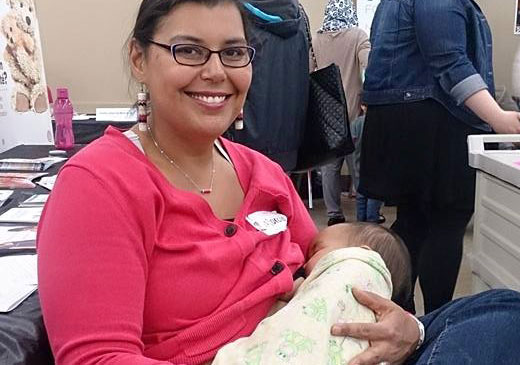Breastfeeding/chestfeeding gives your baby the best possible start and is good for you as well. Exclusive breastfeeding/chestfeeding is recommended for your baby for the first six months of life. You can continue to breastfeed/chestfeed your baby for two years or longer.
Breastfeeding/chestfeeding is more than just feeding your baby. It provides closeness and warmth which helps to create a special bond between you and your baby. This nurturing helps your baby grow and develop.
Breastmilk/Chestmilk – Nature’s Superfood
Breastmilk/chestmilk provides almost everything your baby needs to grow healthy and strong.
- is easiest for your baby to digest
- is always available and ready to go – no preparation is required
- has all the nutrients, calories and fluids your baby needs to grow and develop
- changes over time to meet the needs of your growing baby
- helps protect your baby from lung, ear and stomach infections
- helps prevent allergies, diabetes, eczema, some cancers and obesity
- can reduce the risk of Sudden Infant Death Syndrome (SIDS)
Your breastfed/chestfed baby does not need any water, juice, pop, sugar water, cereal, formula or any other foods. The only extra thing you need to give baby in the first six months is vitamin D daily. Once your baby is six months old, you can keep breastfeeding/chestfeeding and start introducing solid foods.
Did you know?
It is safe to get the COVID-19 vaccine when you are pregnant or breastfeeding/chestfeeding.
Evidence shows that antibodies are passed through the placenta, umbilical cord and breastmilk/chestmilk which protects your baby from COVID-19. So, if you haven’t got the shot, see COVID-19 Vaccine – Province of Manitoba for more information, including where you can get it.
Why Breastfeeding/Chestfeeding is Good for You
- Breastfeeding/chestfeeding helps your body recover from childbirth. You will have less bleeding and it helps your uterus return to its normal size.
- It may help protect you from breast cancer, ovarian cancer and osteoporosis later in life.
- Breastfeeding/chestfeeding can delay the return of your period and temporarily be used as a form of birth control. This is called the Lactation Amenorrhea Method (LAM). Lactation means your body is making breast milk/chestmilk and amenorrhea means you aren’t having a monthly period. Breastfeeding/chestfeeding hormones may stop your body from releasing eggs. When you don’t release eggs, you can’t get pregnant. However, LAM only works if:
- your baby is less than six months old
AND
- your baby is only getting breastmilk/chestmilk (no formula, other type of liquid, or other type of food)
AND
- your period has not returned. (This means you have not had vaginal bleeding for two or more days in a row (not counting bleeding during the first two months after giving birth)
LAM does not work well if you don’t have all three of the above. Talk to your health-care provider to see if LAM is right for you. For more information see Alberta’s webpage on LAM.
The longer you breastfeed/chestfeed, the greater the benefits will be to you and your baby. Breastfeeding/chestfeeding is recommended by:
- Health Canada
- Canadian Paediatric Society
- Dietitians of Canada
- Breastfeeding Committee for Canada
Breastfeeding/chestfeeding can go smoothly or take time to get the hang of. It is different for everyone and can take some practice. This is perfectly normal. If you need help, ask your nurse, doctor or midwife while you are still in your birthing centre or hospital.
Once you go home you can ask your public health nurse, midwife, lactation specialist, primary care provider, knowledge keeper, health centre or nursing station pediatrician for help.
Check out all our breastfeeding/chestfeeding information here
Breastfeeding/Chestfeeding Resources
- Breastfeeding/Chestfeeding Hotline:
- 24-hour nurse phone support:
- Call 204-788-8667 or toll free 1-888-315-9257
- Health Links-Info Santé:
- Phone: 204-788-8200 or toll free 1-888-315-9257
- Open 24 hours a day, seven days a week
- Dial-a-Dietitian
- If you have a nutrition or food question, call Dial-a-Dietitian Manitoba at 204-788-8248 or toll-free 1-877-830-2892.
For more online breastfeeding/chestfeeding information visit:
- Baby Friendly Manitoba; Information for Parents
- Breastfeeding Your Baby – Government of Manitoba
- Breastfeeding – Caring for Kids
- La Leche League Canada
- Getting Started with Breastfeeding – Stanford Medicine
- Support for Transgender and Non-binary Parents – La Leche League International


